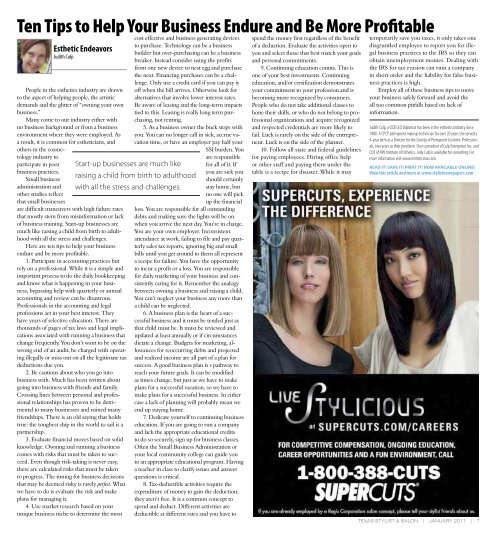January - Stylist and Salon Newspapers
January - Stylist and Salon Newspapers
January - Stylist and Salon Newspapers
You also want an ePaper? Increase the reach of your titles
YUMPU automatically turns print PDFs into web optimized ePapers that Google loves.
Ten Tips to Help Your Business Endure <strong>and</strong> Be More Profitable<br />
Esthetic Endeavors<br />
Judith Culp<br />
People in the esthetics industry are drawn<br />
to the aspect of helping people, the artistic<br />
dem<strong>and</strong>s <strong>and</strong> the glitter of “owning your own<br />
business.”<br />
Many come to our industry either with<br />
no business background or from a business<br />
environment where they were employed. As<br />
a result, it is common for estheticians, <strong>and</strong><br />
others in the cosmetology<br />
industry to<br />
participate in poor<br />
business practices.<br />
Small business<br />
administration <strong>and</strong><br />
other studies reflect<br />
that small businesses<br />
are difficult maneuvers with high failure rates<br />
that mostly stem from misinformation or lack<br />
of business training. Start-up businesses are<br />
much like raising a child from birth to adulthood<br />
with all the stress <strong>and</strong> challenges.<br />
Here are ten tips to help your business<br />
endure <strong>and</strong> be more profitable.<br />
1. Participate in accounting practices but<br />
rely on a professional. While it is a simple <strong>and</strong><br />
important process to do the daily bookkeeping<br />
<strong>and</strong> know what is happening in your business,<br />
bypassing help with quarterly or annual<br />
accounting <strong>and</strong> review can be disastrous.<br />
Professionals in the accounting <strong>and</strong> legal<br />
professions act in your best interest. They<br />
have years of selective education. There are<br />
thous<strong>and</strong>s of pages of tax laws <strong>and</strong> legal implications<br />
associated with running a business that<br />
change frequently. You don’t want to be on the<br />
wrong end of an audit, be charged with operating<br />
illegally or miss out on all the legitimate tax<br />
deductions due you.<br />
2. Be cautious about who you go into<br />
business with. Much has been written about<br />
going into business with friends <strong>and</strong> family.<br />
Crossing lines between personal <strong>and</strong> professional<br />
relationships has proven to be detrimental<br />
to many businesses <strong>and</strong> ruined many<br />
friendships. There is an old saying that holds<br />
true: the toughest ship in the world to sail is a<br />
partnership.<br />
3. Evaluate financial moves based on solid<br />
knowledge. Owning <strong>and</strong> running a business<br />
comes with risks that must be taken to succeed.<br />
Even though risk-taking is never easy,<br />
there are calculated risks that must be taken<br />
to progress. The timing for business decisions<br />
that may be deemed risky is rarely perfect. What<br />
we have to do is evaluate the risk <strong>and</strong> make<br />
plans for managing it.<br />
4. Use market research based on your<br />
unique business niche to determine the most<br />
cost effective <strong>and</strong> business generating devices<br />
to purchase. Technology can be a business<br />
builder but over-purchasing can be a business<br />
breaker. Instead consider using the profits<br />
from one new device to nest egg <strong>and</strong> purchase<br />
the next. Financing purchases can be a challenge.<br />
Only use a credit card if you can pay it<br />
off when the bill arrives. Otherwise look for<br />
alternatives that involve lower interest rates.<br />
Be aware of leasing <strong>and</strong> the long-term impacts<br />
tied to this. Leasing is really long term purchasing,<br />
not renting.<br />
5. As a business owner the buck stops with<br />
you. You can no longer call in sick, accrue vacation<br />
time, or have an employer pay half your<br />
SSI burden. You<br />
are responsible<br />
for all of it. If<br />
you are sick you<br />
should certainly<br />
stay home, but<br />
no one will pick<br />
up the financial<br />
loss. You are responsible for all outst<strong>and</strong>ing<br />
debts <strong>and</strong> making sure the lights will be on<br />
when you arrive the next day. You’re in charge.<br />
You are your own employer. Inconsistent<br />
attendance at work, failing to file <strong>and</strong> pay quarterly<br />
sales tax reports, ignoring big <strong>and</strong> small<br />
bills until you get around to them all represent<br />
a recipe for failure. You have the opportunity<br />
to incur a profit or a loss. You are responsible<br />
for daily marketing of your business <strong>and</strong> consistently<br />
caring for it. Remember the analogy<br />
between owning a business <strong>and</strong> raising a child.<br />
You can’t neglect your business any more than<br />
a child can be neglected.<br />
6. A business plan is the heart of a successful<br />
business <strong>and</strong> it must be tended just as<br />
that child must be. It must be reviewed <strong>and</strong><br />
updated at least annually or if circumstances<br />
dictate a change. Budgets for marketing, allowances<br />
for reoccurring debts <strong>and</strong> projected<br />
<strong>and</strong> realized income are all part of a plan for<br />
success. A good business plan is s pathway to<br />
reach your future goals. It can be modified<br />
as times change, but just as we have to make<br />
plans for a successful vacation, so we have to<br />
make plans for a successful business. In either<br />
case a lack of planning will probably mean we<br />
end up staying home.<br />
7. Dedicate yourself to continuing business<br />
education. If you are going to run a company<br />
<strong>and</strong> lack the appropriate educational credits<br />
to do so securely, sign up for business classes.<br />
Often the Small Business Administration or<br />
your local community college can guide you<br />
to an appropriate educational program. Having<br />
a teacher in class to clarify issues <strong>and</strong> answer<br />
questions is critical.<br />
8. Tax-deductible activities require the<br />
expenditure of money to gain the deduction;<br />
they aren’t free. It is a common concept to<br />
spend <strong>and</strong> deduct. Different activities are<br />
deductible at different rates <strong>and</strong> you have to<br />
Start-up businesses are much like<br />
raising a child from birth to adulthood<br />
with all the stress <strong>and</strong> challenges.<br />
spend the money first regardless of the benefit<br />
of a deduction. Evaluate the activities open to<br />
you <strong>and</strong> select those that best match your goals<br />
<strong>and</strong> personal commitments.<br />
9. Continuing education counts. This is<br />
one of your best investments. Continuing<br />
education, <strong>and</strong>/or certification demonstrates<br />
your commitment to your profession <strong>and</strong> is<br />
becoming more recognized by consumers.<br />
People who do not take additional classes to<br />
hone their skills, or who do not belong to professional<br />
organizations <strong>and</strong> acquire recognized<br />
<strong>and</strong> respected credentials are more likely to<br />
fail. Luck is rarely on the side of the entrepreneur.<br />
Luck is on the side of the planner.<br />
10. Follow all state <strong>and</strong> federal guidelines<br />
for paying employees. Hiring office help<br />
or other staff <strong>and</strong> paying them under the<br />
table is a recipe for disaster. While it may<br />
temporarily save you taxes, it only takes one<br />
disgruntled employee to report you for illegal<br />
business practices to the IRS so they can<br />
obtain unemployment monies. Dealing with<br />
the IRS for tax evasion can ruin a company<br />
in short order <strong>and</strong> the liability for false business<br />
practices is high.<br />
Employ all of these business tips to move<br />
your business safely forward <strong>and</strong> avoid the<br />
all too common pitfalls based on lack of<br />
information.<br />
Judith Culp, a CIDESCO Diplomat has been in the esthetics industry since<br />
1980. A CPCP permanent makeup technician for over 20 years she served a<br />
4-year term as a Director for the Society of Permanent Cosmetic Professionals,<br />
two years as their president. She is president of Culp Enterprises Inc. <strong>and</strong><br />
CEO of NW Institute of Esthetics. Judy Culp is available for consulting. For<br />
more information visit www.estheticsnw.com.<br />
READ IT! SAVE IT! PRINT IT! NOW AVAILABLE ONLINE!<br />
View this article <strong>and</strong> more at www.stylistnewspapers.com<br />
TEXAS STYLIST & SALON | JANUARY 2011 | 7
















